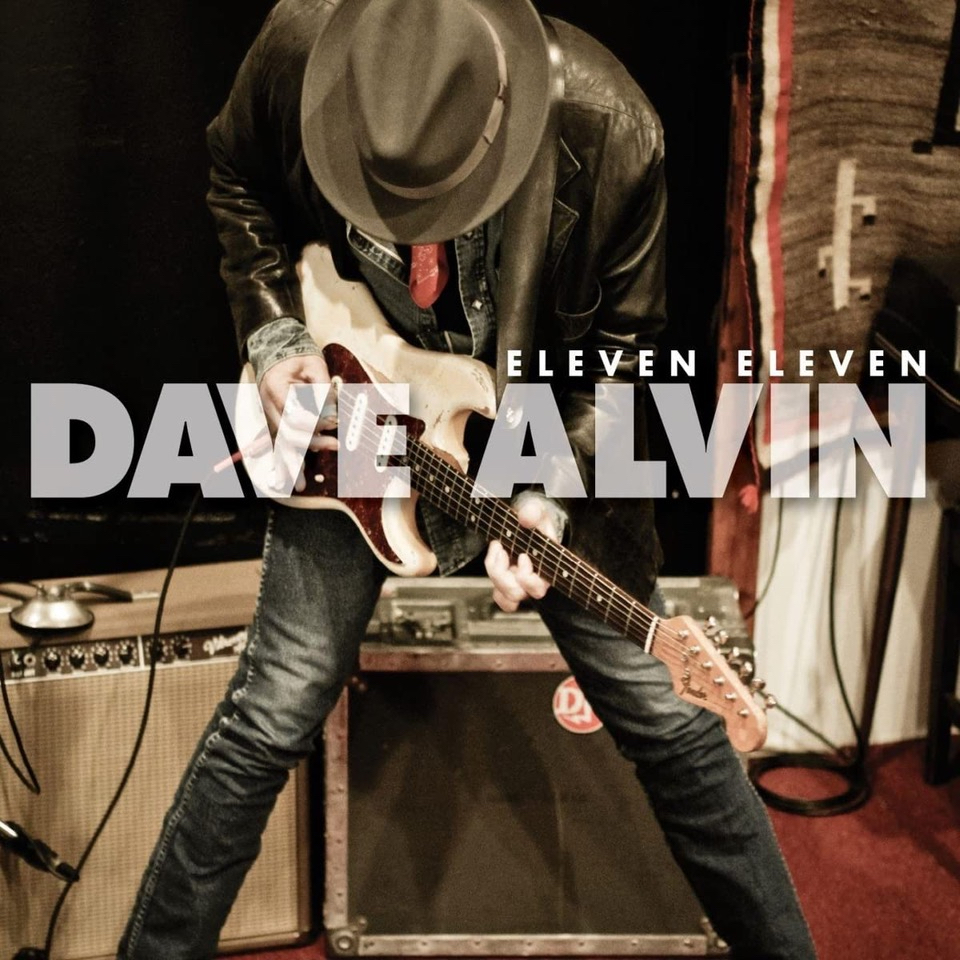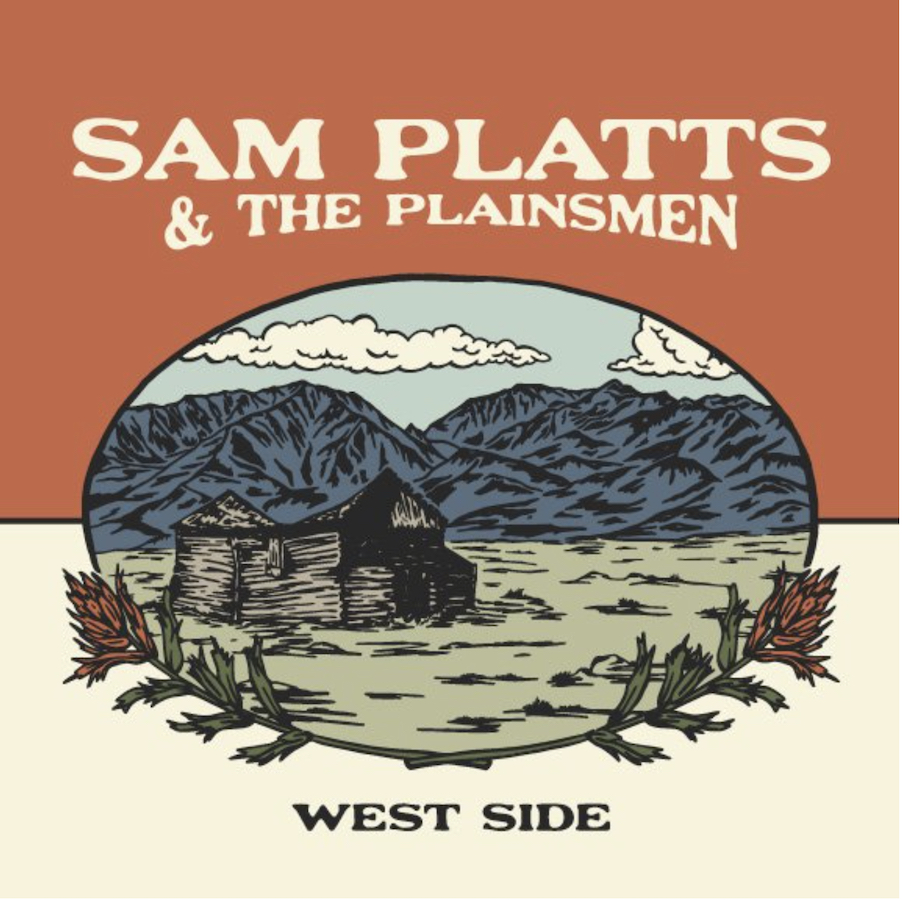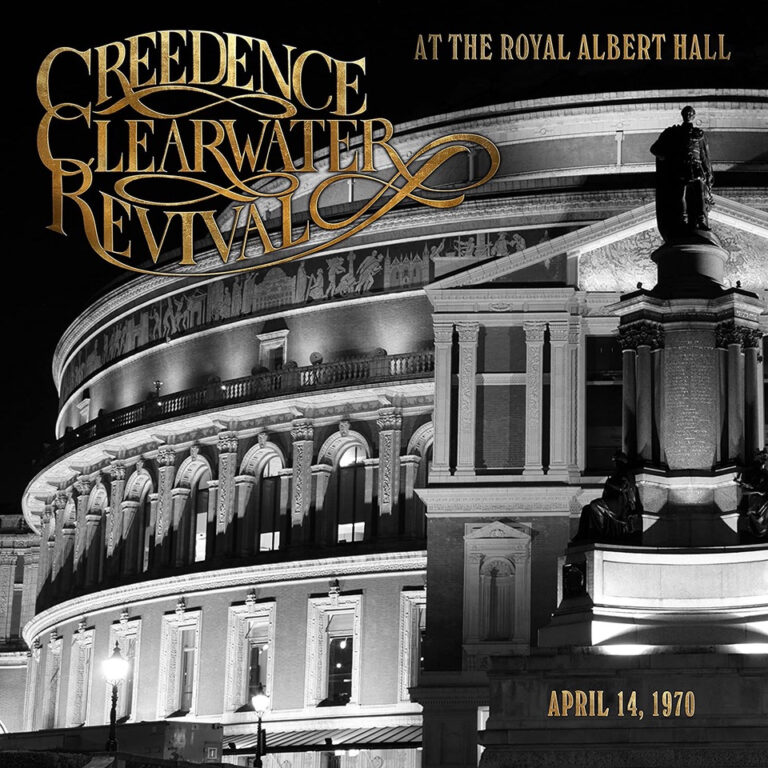You need to keep your eyes wide open when shopping for concert albums by Creedence Clearwater Revival. Live in Europe, for example, doesn’t deliver the whole group: it was recorded in September 1971, after Tom Fogerty’s departure, and released despite his brother John’s strong protests. The Concert, which came out in 1980, was originally mislabeled as a recording of the band’s April 14, 1970, Royal Albert Hall show in London but in fact preserves an Oakland, California concert from about three months earlier. Though you might not notice the band’s name change, meanwhile, a two-disc 1998 live set called Recollection issued from Creedence Clearwater Revisited, a group that features only two of CCR’s four original members, bassist Stu Cook and drummer Doug Clifford.
The new At the Royal Albert Hall record, however, delivers just what its cover touts – the performance by the original band that the 1980 disc erroneously promised so long ago. The show is available on CD and vinyl as well as on Blu-ray, where it is incorporated into a film called Travelin’ Band: Creedence Clearwater Revival at the Royal Albert Hall. A numbered, limited-edition box set serves up all three formats, plus a poster, a reproduction of the 1970 tour program, a 16-page booklet, and a bonus CD and LP, both with music from the film that includes two tracks from the pre-CCR Golliwogs, one from Tommy Fogerty & the Blue Velvets, and nine of Creedence’s key early singles.
Though the group would begin to splinter less than a year after the Royal Albert Hall show, you’d never know it from that performance, which includes seven of their John Fogerty–penned smash hits: “Born on the Bayou,” “Green River,” “Fortunate Son,” “Bad Moon Rising,” “Commotion,” and “Proud Mary,” all – rather incredibly – from 1969, and 1970’s “Travelin’ Band.” Rounding out the setlist are Fogerty’s “Tombstone Shadow” and nearly nine-minute “Keep On Chooglin’,” plus covers of “Midnight Special,” “The Night Time Is the Right Time,” and “Good Golly Miss Molly.”
As good as this program is, it’s missing a lot of CCR high points, such as 1969’s “Lodi” and “Down on the Corner” and early 1970’s “Who’ll Stop the Rain,” “Run Through the Jungle,” and “Up Around the Bend.” Also not here, of course, are the half dozen major hits that CCR released after the date of this concert.
What is included is excellent, however. The live arrangements don’t vary much from the studio ones, but the band is tightly knit and on fire throughout, and its ability to duplicate its records onstage is impressive. Moreover, the concert serves as a reminder that while John Fogerty wrote the songs and served as lead vocalist and guitarist, his three bandmates all made indispensable contributions.
The 86-minute film on Blu-ray (which is also available on Netflix) is a blast, but mostly because it includes the concert rather than because of the approximately half-hour of documentary footage that precedes the show. That footage does convey a bit of noteworthy band history, but it also features frivolous and forgettable interview clips, and actor Jeff Bridges’s narration is loaded with overstatements. First, he says Creedence was “challenging the Beatles for the title of the biggest group in the world,” then that CCR was “now poised to take on the mantle of the biggest group in the world,” and finally that Creedence “could then rightfully lay claim to being the biggest band in the world.”
In fact, while the Beatles’ chart successes made them the No. 1 music act of the 1960s, CCR didn’t even penetrate the list of the Top 25 charting artists in that or any decade, according to Joel Whitburn’s authoritative Record Research. Nor did Creedence have any of the 50 bestselling singles of the sixties and seventies. This is not to take away from the group’s considerable achievements, which include lots of great music and nine Top 10 singles in less than two-and-a-half years. In fact, it accomplished enough – and sound good enough on Live at Royal Albert Hall – to make you wonder why anyone would feel the need to exaggerate.

Dave Alvin Reissues One of His Best CDs
Eleven Eleven, which originally appeared in 2011, was Dave Alvin’s 11th solo album and contained 11 tracks. It has been augmented on a new edition with three bonus numbers, but the moniker still works for multiple reasons. For starters, the reissue marks the 11th anniversary of the original release and came out this year on the 11th day of the 11th month. More importantly, it contains at least a few songs that, on a scale of 1 to 10, might rate 11.
The deep-voiced singer/songwriter/guitarist’s music would be difficult to pigeonhole. This CD’s metadata calls it “country & folk,” but you could also label various tracks Americana, blues, or rock. At any rate, all of Eleven Eleven demonstrates Alvin’s penchant for telling stories – often about characters who are down on their luck – and his talent for doing so evocatively and cogently.
On “No Worries Mija,” which may remind you of Bruce Springsteen’s “Sinaloa Cowboys” or “Meeting Across the River,” a man tells his lover not to worry, though “there may be some trouble” as he heads across the border “to make us some money” by doing “a favor for a friend.” In “Gary, Indiana 1959,” Alvin gives voice over a honkytonk piano to a former “steel-working man” who says that now “the factories are in ruins, decent jobs are hard to find.” And In “Manzanita,” one of the three bonus tracks, Alvin duets with Christy McWilson on a wistful old man’s tale of lost love. Other winners include “Black Rose of Texas,” a poignant farewell to an apparently deceased friend, and “Johnny Ace Is Dead,” one of the best songs to date about the R&B singer’s demise.
The album has its lighter moments as well, such as “What’s Up with Your Brother?,“ a duet with sibling Phil Alvin, who used to share stages with Dave in the Blasters. There’s also “Never Trust a Woman,” a blues rocker about cheating where Alvin duets with the late singer Candye Kane and concludes that “you can never trust a woman,” and furthermore, “you can surely never trust a man.”

A Taste of Western Swing
You can hear the influence of western swing and the Bakersfield sound in the delightfully anachronistic music of vocalist and rhythm guitarist Sam Platts, a rancher/musician who grew up in Wyoming and now lives in Montana.
Backed on his new West Side CD by the Plainsmen – a group that includes his wife, Lilly, on fiddle as well as an upright bassist and an electric guitarist – Platts delivers an originals-dominated program that also features the traditional “Whoopee Ti Yi Yo” and “Saint James Infirmary Blues.” The songs, which address such subjects as drinking, hard times, rural life, and lost loves, often sound redolent of Asleep at the Wheel, a group for which Platts has opened in concert.
Jeff Burger’s website, byjeffburger.com, contains five decades’ worth of music reviews, interviews, and commentary. His books include Dylan on Dylan: Interviews and Encounters, Lennon on Lennon: Conversations with John Lennon, Leonard Cohen on Leonard Cohen: Interviews and Encounters, and Springsteen on Springsteen: Interviews, Speeches, and Encounters.



